#neurodeviance
Explore tagged Tumblr posts
Text
fuck neurodivergent, i’m neurodeviant. neurodiabolical
1 note
·
View note
Text
Why I love the Spymaster #78: Flapping!
Find my full series under the HELP I WUVS HIM tag.
#78: Flapping!
The Spymaster waves his hands energetically in times of great excitement, both positive and negative.
In The Timeless Children, he flaps when berating himself for missing an opportunity for a good one-liner:
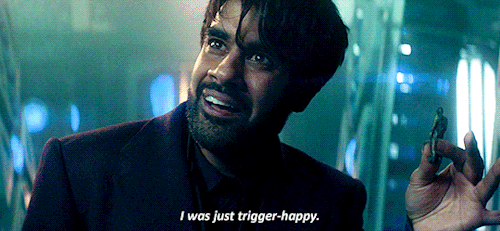
In The Power of the Doctor, he shakes out his hands vigorously when breaking free from UNIT imprisonment:
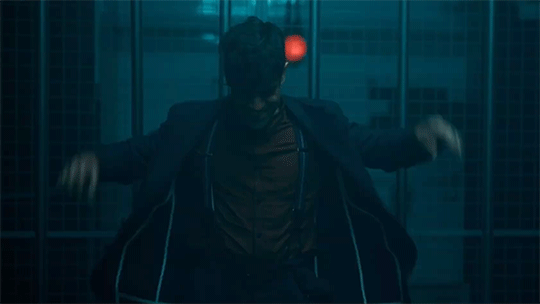
The Spymaster evinces many traits associated with being neurodeviant [see #47: He's neurodeviant! for a discussion of why I use that term] or neurodivergent.
Here's a partial list:
He has a conversational consciousness. See #34 [his reaction to Thirteen’s TARDIS] and #11 [his mind at work]. Included because this is an unusual way to think and therefore possibly indicative of an uncommon neurotype.
He acts everything out. See #46. Included because this is an unusual way to think and therefore possibly indicative of an uncommon neurotype.
He requires a lot of visible effort to codeswitch. See #48 [codeswitching] and #39: You can see him BECOME the Master!
He uses language in a way often associated with neurodeviant self-expression, stimming, coping, etc., including, but not limited to the following: punctiliously precise word use [see #57], saying “Ooooh” [see #38], repeating things [see #31 and #28], and explaining jokes [see #4].
He has a variety of gestures and whole-body movements associated with neurodeviant self-expression, stimming, coping, etc., including, but not limited to the following: bouncing [see #65], nonstandard eye contact [see #42], baring his teeth [see #33], headbanging when frustrated [see #27], rocking when excited [see #14], brainfingers [see #12], dancing/clapping when excited [see #3], and vibrating when angry [see #2].
To this list we can also add flapping!
@natalunasans @whovianuncle @timeladyjamie @rowanthestrange
#HELP I WUVS HIM#the timeless children#spymaster#the spymaster#the power of the doctor#happy flappy#also frustrated flappy#just flappy in general#sacha dhawan#doctor who#dw meta#neurodeviance#neurodivergence#neurodeviant#neurodivergent
71 notes
·
View notes
Text
@sclfmastery -- I've been thinking about this for a few days, and I personally find his perennial search for verbal precision fascinating. There are lots of possible reasons for his constantly self-correcting his vocab:
As you said, he does this as a manifestation of extreme agitation and overstimulation. He's very excited, so his mouth does not move as fast as his thoughts, so he has to go back and fix the wrong words.
I also relate his self-corrections to his excruciating self-consciousness. He wants to be right and accurate, to come across as intelligent and brilliant; he can't stand other people thinking that he's wrong and/or stupid. His deployment of the mental thesaurus will, he hopes, demonstrate that he says exactly what he means
He wants to control something. His schemes surprise him with their fallout and invariably spiral out of his control. He really wants [the illusion of] control, so he focuses on the smallest possible units of things he can control: single words.
As a corollary to his self-correcting vocab, the Spymaster also searches for the right word.
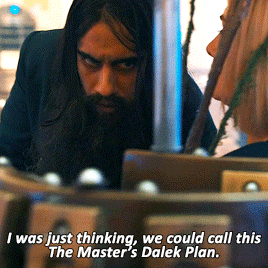

Here he is in The Power of the Doctor, trying to make a callback to the DW episode entitled The Daleks' Master Plan, but he hasn't figured out the exact words.
The Spymaster thinks by talking and acting things out, and this seems to be what's going on here. He has to test his words and actions; that's how he seems to actually process them. This, to me, is also a hallmark of his neurodeviance.
the master is talking in people’s heads in PotD because he’s being creepy? weak take.
the master’s talking in people’s heads in PotD because he’s nonverbal when he’s under significant amounts of stress? based take.
#the spymaster#sacha dhawan#dhawan master#neurodeviance#excruciating self-consciousness#it's really hard work to be the spymaster!
105 notes
·
View notes
Text
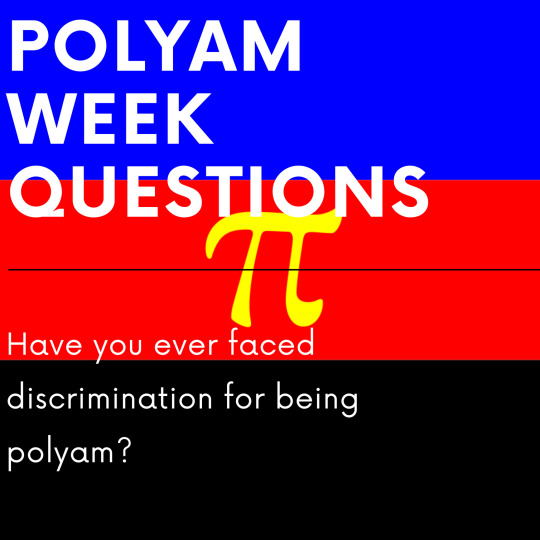
Personally, no. I have been lucky enough to have chosen to live in two very liberal cities as an adult. I also have more privilege than both of my partners and can use the fact that I present as a nicely exotic white cis-femme who fits nicely within conventional beauty standards as a shield that allows me to be openly polyamorous.
My Hispanic-Asian partner faces more with discrimination for being polyam, especially in corporate America. He is already having to balance being a Tex-Asian in the Midwest. Ergo, he presents as pretty "traditional family values" to come across as safe for someone who white folk already see as not properly adhering to the prescribed Asian script.
My trans wife, through circumstance and spoon count, has for the most part left mainstream America, for the betterment of her sanity. I think i can say she is more worried about surviving late stage capitalism as a disabled neurodeviant transwoman. Being polyam helps her thrive.
#polyamorous awareness week#polyam week questions#polyam week#intersectionality bitches#the future is intersectional#intersectional social justice#intersectionality#polyam#polyamory#polyamorous#life with princess#life with pants#polyamory problems#polyamory is...#polyam adulting#polyam adulthood#adulting and polya
29 notes
·
View notes
Video
tumblr
Hey kids you want to try some c y b e r d r u g s ?
Realtalk; this does awesome tingly things to my neurodevious synapses, but I’m pretty sure it’d just be incredibly disorienting and stomach-churning to most people.
8 notes
·
View notes
Text
Neurodeviant
I think catch-all terms for neurodivergence should be more annoying actually. I'm neurocringe. I'm neuro-ouchie. Neurogritty. Neuroslippery. Neuromoist.
45 notes
·
View notes
Text
The Master: Neither mad nor broken
I really dislike it when people call the Master "mad" or "manic" or "insane."
When people do this, they're often trying to evoke the character's sadistic glee, energetic cruelty, penchant for performative melodrama, hamminess, mood swings, ridiculously complicated plans, etc. But, because people aren't using those words, but words associated instead with mental illness, it's very easy for statements about the Master's "madness" or "manic energy" to come across as "He's nuts."
The blurring between sadistic glee, energetic cruelty, performative melodrama, etc. and being nuts implies that sadistic glee and all those other traits are hallmarks of mental illness. To call the Master "mad," then, reinforces the popular conception of mentally ill people as similar to the Master: mean, nasty, destructive, violent, and loving it.
This is, of course, complete bullshit because people with mental illness range widely in what kind of people they are, just like people without mental illness. In particular, the pop culture concept of a mentally ill person as violent belies the fact that mentally ill people are statistically much more likely to be victims, rather than perpetrators, of violence.
Relatedly, I also really loathe characterizations of the Master as "broken."
You see this a lot with other people talking about Sacha Dhawan's portrayal of the Spymaster. Hell, I'm pretty sure even the actor himself said something to that effect about the character in an interview.
Giving the Spymaster a general characterization as "broken" ascribes his thoughts, feelings, and actions all to his unwhole state. If he was unbroken, he would be whole, right, happy, and good. But, because he is "broken," he is also implied to be defective, wrong, miserable, and bad. He is wrong and bad because he is "broken." He is also "broken" because he is bad.
As I've noted at length before, Sacha Dhawan plays the Master as neurodeviant and quite possibly mentally ill. [I'm using the term "neurodeviant" instead of "neurodiverse" because it seems fitting for a character who would relish declaring himself a deviant!] The character's neurodeviance and mental illness are neutral traits, neither good nor bad.
However, when the Master is called "mad" and "broken," his neurodeviance and his mental illness are marked as defective, wrong, and bad, along with all of his other character traits. His deviations from the norm are seen as intrinsically deleterious, even though his neurodeviance and his mental illness aren't necessarily so.
It's very ableist.
Instead, I'd say that the Spymaster is a really unhappy person, quite possibly experiencing major depression and definitely suicidal inclinations. Between his incorporation of the Matrix and the Cyberium, he has overtaxed his mind and discombobulated himself. With the once fixed tenets of his life now in flux, he doubles down on sadism and violence as a way to prove to himself that he's still the same as ever. His desperation, confusion, and terror persist, however.
He's also neurodeviant [autistic at the very least!] and mentally ill, but these traits do not arise from him choosing to be a really mean-spirited, manipulative jerk with horrendous coping mechanisms. Instead, his mean-spirited jerkiness and horrendous coping mechanisms affect the manifestations of his mental illness and neurodeviance.
@natalunasans @sclfmastery
#the master#doctor who#dw meta#sacha dhawan#the spymaster#spymaster#why I love Dhawan Master#HELP I WUVS HIM#madness#brokenness#ableism#mental illness#neurodeviance#neurodiversity
39 notes
·
View notes
Text
Why I love the Spymaster #105: He's a dancer!
Find my full series under the HELP I WUVS HIM tag.
The Spymaster is a notoriously unrestrained character. His repetitions [#31] show how use does not seem to think before he speaks, but in the very process of speaking. He seems to think by acting out his thoughts and emotions [#11: You can SEE his mind at work!]. Additionally, his gestures provide insight into his preoccupations [#12: His brainfingers!]. He involuntarily vibrates when he's angry [#2] and when he's happy [#104]. He rocks from side to side unselfconsciously when anticipating something [#14], flaps when happy [#78], and exhibits lots of movements associated with autistic stimming and ticcing [see #78 for an extensive list].
The Spymaster is also notorious for dancing, i.e., moving purposefully with rhythm and choreography. We have him intentionally twirling in Spyfall I, right after he says he controls everything:

We have another twirl in The Power of the Doctor when he explains to Thirteen that the CyberMasters and Daleks are his "fam:"
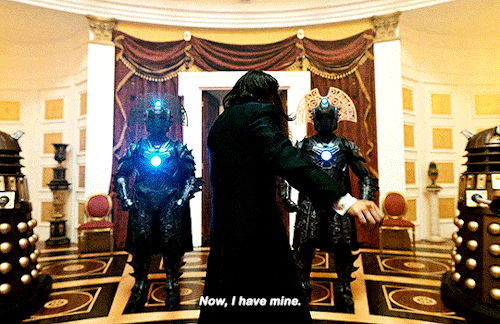
And then, of course, there's his actual dance party to Rasputin shortly afterward.
Saying that the Spymaster is a dancer is different from celebrating his nerdy dancing [#3] or his OMINOUS yet dweeby dancing [#69]. Both of those mini essays focus on instances of dancing, but this mini essay speaks more generally. "He's a dancer!" = The Spymaster likes dancing, and he's a dancer, insofar as a dancer is someone who makes art out of the body in motion.
I call him a dancer for the following reasons:
He already emanates his emotions through facial expression, hand gestures, and bodily movements, so dancing, an art about one's body in motion, has an understandable appeal to him.
Dance, like theater, is a performance art, calling on an audience to admire the dancer's beauty and physical prowess. This appeals to the Spymaster because he's an over-the-top performer who needs an audience and also because he considers himself beautiful.
We know he likes club music [#96: Further implications of the Rasputin song!], so Rasputin [Majestic remix] is probably not the only tune he likes to groove to.
While expressive, dancing is not the same as the Spymaster's sometimes involuntary physical expression of emotion that the Spymaster frequently has. Dancing involves intentional control of one's body, which speaks deeply to the Spymaster, who's constantly worrying that he has lost control.
Another reason for the Spymaster's fondness for dancing connects to his neurodeviance or neurodivergence [#47]. I imagine that the Spymaster may be frustrated on occasion with his involuntary or unconscious stimming/ticcing. The planned choreography of dancing may help him to feel more at home with himself and grounded. In fact, his overall serious expression and relatively restrained body language during the Rasputin dance indirectly suggest that his dance of intimidation may be successfully quieting his impulses of nervous energy.
And on that note, folks, I am taking a break. I have been inflicting HELP I WUVS HIM mini essays about the Spymaster onto a hapless public for two solid months now. I haven't run out of mini essays. I've just run out of motivation.
Possible future topics include American Gothic, the Spymaster's gender, the Spymaster in the short story "The Master and Margarita," detailed analysis of the seismology professor costume, "Did you know she used to be a man?", and more!
Also, if all three of my readers have any things that you love about the Spymaster, feel free to send them to me. Or if you notice interesting things about the character and you have your own interpretations, send them along too. I don't guarantee that I will use what you send, but I will credit and tag you if I do.
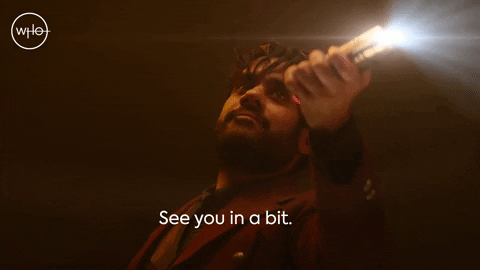
P.S. If you like the kind of Masterful humor abounding in these essays, check out my parody self-help book Your Villain & You. It features a LOT of characters who look suspiciously like the Spymaster!
@natalunasans @sclfmastery @timeladyjamie @whovianuncle @rowanthestrange
#the spymaster#spymaster#sacha dhawan#HELP I WUVS HIM#body language#dancing#he's a dancer#stimming#ticcing#interpretive dance#everything's a dance#doctor who#dw meta#dancing while neurodeviant#dancing while neurodivergent#neurodeviance#neurodivergence
10 notes
·
View notes
Text
It's late so I'm not going to go particularly deep into these and they're not going to be perfect but here are some cursory ideas:
Neoneuro/neuroneo (neuro + neo "new")
neurovari/neurovary/neurovariant (neuro + variance/varying/variant, seems like almost too much of an umbrella term)
neurother (neuro + other)
neurodeviant (neuro + deviant, I'll probably use this for something else on the more adult side considering the connotations)
neurocontrary (neuro + contrary, this one fucks hard but i might use it to mean "autism comorbid with adhd" instead of the overlap between them)
similar to above, contraneuro?
neuropeculiar
neurostrange (this fucks but again, not sure i'll use it specifically for the overlap)
noveneuro (novel "new" + neuro)
neurosundry (neuro + sundry "many/varied" - this one is fucking baller and I'll probably develop it)
honestly ppl use neurodivergent as a way to mean the intersection of autism and adhd when it's not that but all I can see from that is that we need a word for the intersection of autism and adhd. Maybe i'll come up with something.
11 notes
·
View notes
Text
Reasons I love Dhawan Master #47: He’s neurodeviant!
In no particular order, here is an illustrated list of reasons I love Sacha Dhawan’s Master, most of which boil down to the way that Sacha Dhawan so expertly embodies the Master to such a degree that we can look into this character’s mind as we never have before.
Find my full series under the HELP I WUVS HIM tag or at the why I love Dhawan Master tag.
Read more about my version of Dhawan Master/Thirteen [plus fam] in The Happy Famverse, a series of comic shorts about the domestic lives of [extended] Team TARDIS.
#47: He’s neurodeviant! Yes, I am using that particular word, rather than “neurodiverse” or “neurodivergent” or “neuroatypical,” for a reason. “Deviant” has long been a code word for “anything the people in charge don’t approve of,” including one’s intelligence, one’s social interactions, one’s sexuality, one’s abilities, etc., etc., etc. As an extension, it’s also associated with iconoclastic rebellion and often stubborn adherence to something contrary to the mainstream. I think that the Master [generally speaking, but especially this one] would glorify their renegade spirit and other condemned traits by turning the term “deviant” into one of pride. So that’s why he’s neurodeviant.
In this case, “neurodeviant” means “possessing and using a neurotype, brain style, thought pattern, and/or means of self-expression that’s rather uncommon.” I’m sure it’s pretty obvious to a lot of readers already that he is neurodeviant [just as it was pretty obvious to a certain number of you that he finds choking a turn-on], but I don’t care. I start from the basics and prove those so that I can work my way into more complex arguments.
Evidence for the Master’s neurodeviance is all over the place. Here are several key examples, though this is not a comprehensive list.
He has a conversational consciousness. See #34 [his reaction to Thirteen’s TARDIS] and #11 [his mind at work].
He acts everything out. See #46 for an in-depth example.
He has a variety of behaviors particularly associated with neurodeviant self-expression, stimming, coping, etc., including, but not limited to the following: nonstandard eye contact [see #42], saying “Ooooh” [see #38], baring his teeth [see #33], repeating things [see #31 and #28], headbanging when frustrated [see #27], rocking when excited [see #14], brainfingers [see #12], dancing/clapping when excited [see #3], and his vibrating when angry [see #2].
I want to know why the Master is neurodeviant. Why did Sacha Dhawan and the showrunners decide to make this version of the character so obviously neurodeviant?
I have two possible answers, one from the showrunners’ perspective, one from the actor’s. From the showrunners’ perspective, the Master has always been mad, insane, nuts, crazy, mentally ill, whatever. The character’s mental traits have also been inextricably linked with their cruel, immoral actions, suggesting that the Master is a nasty sadistic person because of their mental traits. In the showrunners’ minds, crazy = evil. Furthermore, neurodeviance, according to them, isn’t so far from insanity. Neurodeviance = crazy = evil. In this interpretation, the showrunners may be using the Master’s neurodeviance as a [crappy, horrible, wrong, ableist, bigoted] attempt at explaining his mean-spirited, coercive, sadistic actions.
From Sacha Dhawan’s perspective, things might look a bit different. He writes openly on Instagram about having Crohn’s disease and chronic anxiety. He doesn’t discuss Crohn’s a lot, but he does mention that its symptoms can be disruptive. He goes into a little more detail about chronic, debilitating anxiety, how it distorts his thoughts, and why it’s important to bring this subject out in the open so that people don’t feel so ashamed about it. In other words, he’s intimately familiar with health limitations/chronic pain/physical disability, as well as mental pain and suffering/mental illness/unfun ways in which your brain messes with your head. It’s possible that he plays the Master as neurodeviant because he has some familiarity with uncommon physical and mental conditions and wants to draw on those to represent the Master realistically and sympathetically, at least as far as neurodeviance is concerned.
I see both possible answers at work when the Master’s on the screen. Sometimes he’s just an insane megalomanaical dipshit with dreams of creating a new race. Sometimes that perspective even affects the actors. In an interview with Sy Fy Fangirls, Sacha Dhawan talks about surprising Jodie Whittaker and gang with the revelation on the plane that O is the Master. He says, “That was the first time Jodie and the cast and crew had actually seen me as the Master and how I was going to do it and they were like, ‘Wow, okay. This guy's crazy.’“ Hey, it’s the nuts = evil = nuts equation in practice!
At the same time, I also see the more empathetic perspective. Indeed, in the same interview, Sacha Dhawan described the character as “stooped [I think this is supposed to be “steeped”] in history and emotion, which is what I wanted to bring to the surface. By doing that, I think the audience, as much as they hate him, will also sympathize with him and feel for him.” [Sidenote: Obviously he was unfamiliar at this point with just how much certain people love the character and will side with any version for various reasons.] And I see that emphasis on history and emotion, as opposed to batshit evil, in Sacha Dhawan’s performance. I see that in the way that he performs the character’s neurodeviance consistently, meticulously, realistically, and, as far as I can tell, respectfully. Rather than a source of comedy or an explanation for the Master’s cruelty, Sacha Dhawan tends to portray the Master’s neurodeviance as a neutral aspect of the character. That is so fuckin’ rare these days that I have to write rapturous essays when it happens.
@natalunasans @spoonietimelordy @queen-of-meows @sclfmastery
#sacha dhawan#dhawan master#why I love Dhawan Master#HELP I WUVS HIM#neurodeviant#neurodeviance#neurodeviant master#neurodivergent master#autistic master#crazy and evil??#evil because crazy??#how to play a neurodeviant character#Step 1 -- Find a really cool adjective like neurodeviant.
36 notes
·
View notes
Text
Why I love Dhawan Master #48: His codeswitching!
In no particular order, here is an illustrated list of reasons I love Sacha Dhawan’s Master, most of which boil down to the way that Sacha Dhawan so expertly embodies the Master to such a degree that we can look into this character’s mind as we never have before.
Find my full series under the HELP I WUVS HIM tag or at the why I love Dhawan Master tag.
Read more about my version of Dhawan Master/Thirteen [plus fam] in The Happy Famverse, a series of comic shorts about the domestic lives of [extended] Team TARDIS.
#48: His codeswitching! See #42 for an analysis of his changing body language.
As a quick reminder, you can see the code switch in the difference between his suppressed body language with near-standard eye contact as O...

...to his non-standard eye contact and gestures when he’s by himselves talking to himselves.
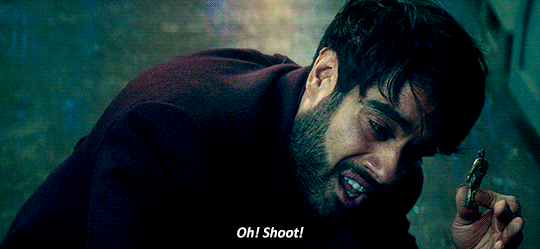
You can also see the sheer amount of effort that he requires to codeswitch when he’s changing out of O and becoming himselves. I go into it in #39 when talking about how the moment below catches him in the midst of switching.

This isn’t really a new reason for loving him, but more a repackaging of existing reasons. It only dawned on me recently that both of these examples constituted codeswitching. His high-effort codeswitching is yet another practice that supports my interpretation of him as neurodeviant!
#the master#dhawan master#HELP I WUVS HIM#why I love Dhawan Master#sacha dhawan#codeswitching#code switching#autistic master#codeswitching master#neurodeviant#neurodeviance#neurodeviant master
15 notes
·
View notes
Text
Reasons I love Dhawan Master #57: He's on a quest for the right word!
Find my full series under the HELP I WUVS HIM tag or at the why I love Dhawan Master tag.
@sclfmastery and I have been musing about the Spymaster's verbal manifestations of neurodeviance, and I think one of them is his ongoing search for the perfect word.
@sclfmastery says: "He corrects himself to the point of fastidious precision, when it comes to word choice (“once upon a time, NO! ….once upon several times” ; “you will be destroyed, NO!….you will be erased”)..." and surmises that many of his verbal stims result from "extreme agitation/overstimulation."
There are lots of possible reasons for his constantly self-correcting his vocab:
As @sclfmastery says, he does this as a manifestation of extreme agitation and overstimulation. He's very excited, so his mouth does not move as fast as his thoughts, so he has to go back and fix the wrong words.
I also relate his self-corrections to his excruciating self-consciousness. He wants to be right and accurate, to come across as intelligent and brilliant; he can't stand other people thinking that he's wrong and/or stupid. His deployment of the mental thesaurus will, he hopes, demonstrate that he says exactly what he means
He wants to control something. His schemes surprise him with their fallout and invariably spiral out of his control. He really wants [the illusion of] control, so he focuses on the smallest possible units of things he can control: single words.
As a corollary to his self-correcting vocab, the Spymaster also searches for the right word.
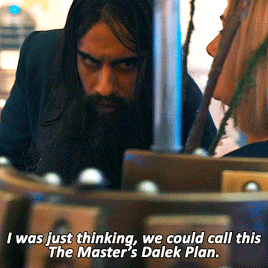

Here he is in The Power of the Doctor, trying to make a callback to the DW episode entitled The Daleks' Master Plan, but he hasn't figured out the exact words.
I mentioned in earlier entries on this list that the Spymaster thinks by talking and acting things out [#11: "You can see his mind at work!" and #46: "He acts everything out!"], and this seems to be what's going on here. He has to test his words and actions; that's how he seems to actually process them. This, to me, is also a hallmark of his neurodeviance.
I just thought of something more distressing... The Spymaster has a particular obsession with "the classics," callbacks, and references to his previous selves. I wonder if his use of his internal thesaurus is him trying to be as witty and intimidating as he was in the past, but then doubting himself or being unable to equal a past self's wit. Is he always checking his vocab because he's comparing his current self to his past selves and finding his current self wanting? Is he trying to achieve the masterful wit of other Masters and doubting that, on some level, that's just not his strength? If so, then his excruciating self-consciousness extends to comparing himself to his past selves too. No wonder he's exhausted! He never thinks he's good enough.
#the master#doctor who#dw meta#sacha dhawan#the spymaster#spymaster#why I love Dhawan Master#HELP I WUVS HIM#he suspects he's a failure#so he tries to at least make his words perfect#but he hasn't quite gotten it yet
55 notes
·
View notes
Text
Hey! Are you a trans/GNC/NB and/or BIPOC Doctor Who fan?
Do you like to write or create visual art about trans/GNC/NB and/or BIPOC characters being AWESOME in the Doctor Who universes?
Do you want to support my local GLBTQ’s organization’s trans and QTPOC programming and fellow creators? [The Pride Center of Vermont.]
Do you want to use your powers for good?
Then watch this space for further announcements about my latest upcoming fanthology project, Gender Who?.
@natalunasans @spoonietimelordy @queen-of-meows @brokenbluedoors @bloodofthepen @sclfmastery @meloartist @ouidasart @thetransgirlwhoneverwas @liria10 @ineternity-ao3 @mastershearts @ anyone else who might be interested
Who I am: I’m Elizabeth A. Allen, a white, queer, neurodeviant, nonbinary writer, editor, and Vermonter. I contributed to Unbound: Adventures in Space and Time and contributed to/edited Master Works: Companions Meet the Doctor’s Greatest Frenemy.
#doctor who#trans characters#gnc characters#bipoc characters#fanfic#charity anthology#fan creators#fanart#use your powers for good#whoniverse#and while i'm here#bill potts deserves better#alison cheney deserves better#martha jones deserves better#mickey smith deserves better#ruth doctor deserves better#ryan sinclair deserves better#grace o'brien deserves better#danny pink deserves better
80 notes
·
View notes
Photo

HEYYYYYYY! Look who got a digital partner! Yup! The Master! She’s still in progress.
D/M at the carnival. Test render from an upcoming piece of plotlessness!
D: “HEY LET’S GO DO A FUN THING!”
M: “Everyone is thinking too loud, and I’m exhausted from having to keep them out of my head.”
P.S. Yes, D is wearing her carnival goggles. Yes, M is wearing leggings. All his short trousers that don’t reach are in the wash, and leggings are comfy. They also have a certain genderfucking quality...
@natalunasans @sclfmastery for neurodeviant Master @dashing-hyphen @queen-of-meows
#thirteen/dhawan!master#dhawan master#the master#the doctor#thirteenth doctor#personality differences#digital art
17 notes
·
View notes
Text
Hi @sclfmastery! Thanks again for your thoughtful extension of my analysis.
First off, I didn't really mention this, but my discussion of the Master as "mad" and "broken" comes from personal experience. I'm mentally ill [major depressive disorder] and some kind of neurodeviant. I also have a long engagement with disability rights, disability studies, and thinking critically about the societal construction of disability. I also have a noted interest in pedantic textual analysis.
I object to the term "broken" as a word. To me, it so clearly implies unwholeness, abnormality, and a pathetic lack compared to a much-desired wholeness. These are the ableist connotations that I abhor.
You say that the Spymaster's mind-blowing experiences particular to his incarnation [e.g., with the Matrix and the Cyberium] really fuck him up. The traumatic experiences also affect how his neurodeviance manifests. The fact that he exists in an ableist universe also causes him pain. I agree.
You say that the Master has always been neurodeviant. Ayup, I agree on that one. I think that Sacha Dhawan's portrayal is novel, however, because the neurodeviance is a clear, considered, constant, key aspect of his interpretation of the character.
You observe that the Spymaster's experiences with mental illness, mental overload, and ableism converge to erase his sense of autonomy and selfhood and bring up suicidal wishes. Yet again, I agree. I just wouldn't call him "broken." I'd say more that he is debilitated by mental health challenges that we haven't seen the Master encounter before of this magnitude. These challenges interact with his neurodeviance in ways that make him much more visibly desperate, lonely, fearful, and emotionally vulnerable than other incarnations. He seems to be the most miserable and the most hopeless incarnation of the character yet.
I just don't like the word "broken." I agree with you, though, that he's definitely worse off mentally and emotionally than the others.
The Master: Neither mad nor broken
I really dislike it when people call the Master "mad" or "manic" or "insane."
When people do this, they're often trying to evoke the character's sadistic glee, energetic cruelty, penchant for performative melodrama, hamminess, mood swings, ridiculously complicated plans, etc. But, because people aren't using those words, but words associated instead with mental illness, it's very easy for statements about the Master's "madness" or "manic energy" to come across as "He's nuts."
The blurring between sadistic glee, energetic cruelty, performative melodrama, etc. and being nuts implies that sadistic glee and all those other traits are hallmarks of mental illness. To call the Master "mad," then, reinforces the popular conception of mentally ill people as similar to the Master: mean, nasty, destructive, violent, and loving it.
This is, of course, complete bullshit because people with mental illness range widely in what kind of people they are, just like people without mental illness. In particular, the pop culture concept of a mentally ill person as violent belies the fact that mentally ill people are statistically much more likely to be victims, rather than perpetrators, of violence.
Relatedly, I also really loathe characterizations of the Master as "broken."
You see this a lot with other people talking about Sacha Dhawan's portrayal of the Spymaster. Hell, I'm pretty sure even the actor himself said something to that effect about the character in an interview.
Giving the Spymaster a general characterization as "broken" ascribes his thoughts, feelings, and actions all to his unwhole state. If he was unbroken, he would be whole, right, happy, and good. But, because he is "broken," he is also implied to be defective, wrong, miserable, and bad. He is wrong and bad because he is "broken." He is also "broken" because he is bad.
As I've noted at length before, Sacha Dhawan plays the Master as neurodeviant and quite possibly mentally ill. [I'm using the term "neurodeviant" instead of "neurodiverse" because it seems fitting for a character who would relish declaring himself a deviant!] The character's neurodeviance and mental illness are neutral traits, neither good nor bad.
However, when the Master is called "mad" and "broken," his neurodeviance and his mental illness are marked as defective, wrong, and bad, along with all of his other character traits. His deviations from the norm are seen as intrinsically deleterious, even though his neurodeviance and his mental illness aren't necessarily so.
It's very ableist.
Instead, I'd say that the Spymaster is a really unhappy person, quite possibly experiencing major depression and definitely suicidal inclinations. Between his incorporation of the Matrix and the Cyberium, he has overtaxed his mind and discombobulated himself. With the once fixed tenets of his life now in flux, he doubles down on sadism and violence as a way to prove to himself that he's still the same as ever. His desperation, confusion, and terror persist, however.
He's also neurodeviant [autistic at the very least!] and mentally ill, but these traits do not arise from him choosing to be a really mean-spirited, manipulative jerk with horrendous coping mechanisms. Instead, his mean-spirited jerkiness and horrendous coping mechanisms affect the manifestations of his mental illness and neurodeviance.
@natalunasans @sclfmastery
#the master#doctor who#dw meta#sacha dhawan#the spymaster#spymaster#why I love Dhawan Master#HELP I WUVS HIM#mental illness#neurodeviance#ableism#brokenness#madness#and other fun stuff
39 notes
·
View notes